Your Heart Has Been Talking All Along
Let’s clear something up — your heart isn’t just a blood pump; it’s your body’s most emotionally intelligent organ. It speeds up when you’re nervous, slows down when you’re calm, skips a beat when you’re in love (or late to a deadline), and quite literally responds to your every thought and feeling. The Harvard Medical School (2020) calls it “heart-brain communication.” Turns out, the heart sends more signals to the brain than the brain sends to the heart. In short — your heart doesn’t just follow orders; it gives them. So when your heart says something feels “off,” it’s not being dramatic. It’s being diagnostic.The Doctor’s Perspective vs. The Heart’s Voice
Doctors are incredible — they interpret data, prescribe solutions, and save lives every day. But here’s the thing — a doctor sees you for 15 minutes. Your heart lives with you 24/7. Your doctor can read your ECG. But only you can feel the early signals — that mild tightness after climbing stairs, the unusual fatigue, the faster pulse after meals, the headaches you now call “normal.” You know your body better than anyone. If something feels unusual — it probably is. Unfortunately, most of us have mastered the art of explaining away symptoms: “It’s just gas.” “It’s just stress.” “It’s just because I skipped breakfast.” Spoiler: Sometimes “just” is not just.The Science Behind Listening to Yourself
Your heart and brain are constantly talking through something called the vagus nerve — a superhighway of emotional and physical feedback. When your heart rate variability (HRV) drops — it’s a sign of stress, fatigue, or inflammation. When it’s balanced — it means your body is in sync. This is why mindfulness, breathing, and even laughter are now part of cardiac care plans. They literally reset the heart-brain dialogue. According to the Cleveland Clinic (2023), patients who regularly practice mindful breathing improve HRV and reduce their risk of heart events by up to 30%. Listening to your heart isn’t just poetic — it’s preventive medicine.Listening Starts With the Subtle Signs
Let’s get practical. Here are a few early signs your heart often gives before things go wrong — the whispers before the alarms: Unusual Fatigue – You’re exhausted doing things that were easy before. Not laziness. Possible oxygen deficit. Mild Chest or Jaw Tightness – Not pain, but a persistent heaviness or “pressure.” Don’t wait till it’s severe. Irregular Heartbeats – If your heart suddenly feels like it’s “fluttering,” “skipping,” or racing for no reason, listen. Swelling in Feet or Ankles – A sign that your heart is struggling to pump efficiently. Unexplained Anxiety – Your mind feels restless, but sometimes it’s your body sending emergency signals. These aren’t reasons to panic. They’re reasons to pay attention.Why We Don’t Listen (And Keep Ignoring the Obvious)
Because honestly… we’re busy. We have deadlines, children, traffic, and Netflix. We normalize the strange and silence the subtle.- We pop painkillers instead of asking why we have pain.
- We change pillows when we should check blood pressure.
- We Google “heartburn” instead of “heart warning.”



